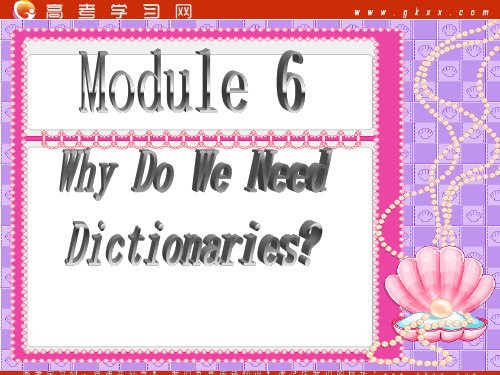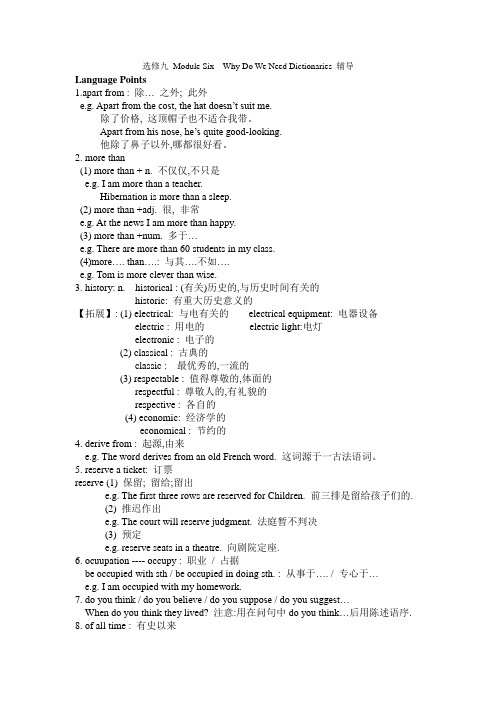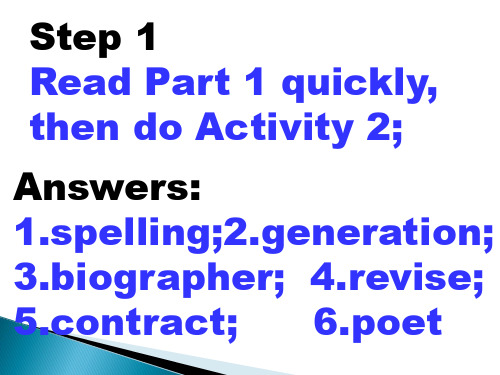高中英语 话题导入(Module 6 Why Do We Need Dictionaries)教学素材 外研版选修9
Module 6《Why Do We Need Dictionaries》课件1(38张PPT)(外研版选修9)

etc.? 5. Other words which are derived from the headword (i.e.the
__m_a_i_n___ word)
Think of as many words connected with dictionaries as possible
refer to … look up…. consult… hard paper…
Read the questions and add an extra example
1. What part of speech is the word?
2. Samuel Johnson finished his Байду номын сангаасictionary in three years.
3. Johnson’s dictionary was the first to illustrate the meanings of words by using literary quotation.
7. If you _i_ll_u_s_tr_a_t_e___ the meaning of something. You use an idea or a picture to show what it means.
1. Samuel Johnson was one of the greatest literary figures of all time in America
Example: (1) Monday (2) _M__u__s_li_m__
高中英语 Module 6 Why Do We Need Dictionaries核心要点回扣课件

MOMODA POWERPOINT
Lorem ipsum dolor sit amet, consectetur adipiscing elit. Fusce id urna blandit, eleifend nulla ac, fringilla purus. Nulla iaculis tempor felis ut cursus.
模块综合测评
9、静夜四无邻,荒居旧业贫。。*** 10、雨中黄叶树,灯下白头人。。**** 11、以我独沈久,愧君相见频。。***** 12、故人江海别,几度隔山川。。**** 13、乍见翻疑梦,相悲各问年。。***** 14、他乡生白发,旧国见青山。。**** 15、比不了得就不比,得不到的就不要。。。***** 16、行动出成果,工作出财富。。*** 17、做前,能够环视四周;做时,你只能或者最好沿着以脚为起点的射线向前。。**** 9、没有失败,只有暂时停止成功!。*** 10、很多事情努力了未必有结果,但是不努力却什么改变也没有。。**** 11、成功就是日复一日那一点点小小努力的积累。。***** 12、世间成事,不求其绝对圆满,留一份不足,可得无限完美。。**** 13、不知香积寺,数里入云峰。。***** 14、意志坚强的人能把世界放在手中像泥块一样任意揉捏。**** 15、楚塞三湘接,荆门九派通。。。***** 16、少年十五二十时,步行夺得胡马骑。。*** 17、空山新雨后,天气晚来秋。。**** 9、杨柳散和风,青山澹吾虑。。*** 10、阅读一切好书如同和过去最杰出的人谈话。**** 11、越是没有本领的就越加自命不凡。***** 12、越是无能的人,越喜欢挑剔别人的错儿。**** 13、知人者智,自知者明。胜人者有力,自胜者强。***** 14、意志坚强的人能把世界放在手中像泥块一样任意揉捏。**** 15、最具挑战性的挑战莫过于提升自我。。***** 16、业余生活要有意义,不要越轨。*** 17、一个人即使已登上顶峰,也仍要自强不息。****
外研版高中英语选修九Module 6Why Do We Need DictionariesGrammar学案1

选修九Module Six Why Do We Need Dictionaries 辅导Language Points1.apart from : 除… 之外; 此外e.g. Apart from the cost, the hat doesn’t suit me.除了价格, 这顶帽子也不适合我带。
Apart from his nose, he’s quite good-looking.他除了鼻子以外,哪都很好看。
2. more than(1) more than + n. 不仅仅,不只是e.g. I am more than a teacher.Hibernation is more than a sleep.(2) more than +adj. 很, 非常e.g. At the news I am more than happy.(3) more than +num. 多于…e.g. There are more than 60 students in my class.(4)more…. than….: 与其….不如….e.g. Tom is more clever than wise.3. history: n. historical : (有关)历史的,与历史时间有关的historic: 有重大历史意义的【拓展】: (1) electrical: 与电有关的electrical equipment: 电器设备electric : 用电的electric light:电灯electronic : 电子的(2) classical : 古典的classic : 最优秀的,一流的(3) respectable : 值得尊敬的,体面的respectful : 尊敬人的,有礼貌的respective : 各自的(4) economic: 经济学的economical : 节约的4. derive from : 起源,由来e.g. The word derives from an old French word. 这词源于一古法语词。
[推荐精选]Why Do We Need Dictionaries上课学习上课学习教案
![[推荐精选]Why Do We Need Dictionaries上课学习上课学习教案](https://img.taocdn.com/s3/m/f633cd17dd36a32d737581c7.png)
Why Do We Need Dictionaries教案www.5ywhyDoweNeedDictionaries教案Book9module6whyDoweNeedDictionaries?教学内容:通过阅读“塞缪尔•约翰逊词典”与《牛津英语大辞典》等的学习,探讨词典这一中心话题,并就话题展开听、说、读、写的综合技能训练。
同时引导学生深入了解词典,科学评价词典,合理利用词典。
开拓词典的功用价值。
学习目标:(1)熟练掌握生词,扩大词汇量(2)掌握常用词by,do/does/,if,or,want,why在典型语境下的正确运用。
(3)词典文化,包括词典的历史沿革及发展现状。
技能目标:(1)听。
在听的过程中能够比较准确地理解对话和语段中新出现的词汇,并能够用关键词记下主要的信息;能够听懂课本提供的对话听力材料,并完成相关的练习。
(2)说。
运用本模块所学词汇和短语介绍塞缪尔•约翰逊的词典、牛津英语大辞典》和其他词典;在表达中能完整、准确、清楚地做口头通知。
(3)读。
阅读中能够识别新学词汇、短语并根据语境推断其意义;正确理解介绍词典知识的阅读和有关的其他短文;学会从书面材料中有效汲取文化信息。
(4)写。
运用本模块所学词汇和短语完成所有的书面练习;在书面表达中能够根据行文逻辑需要正确运用一些连接词;能够较清楚地写出比较地道的书面通知。
学习策略:在英语学习过程中了解和吸收异域民族文化特别是词典文化的精华;注意不同思维方式的学习,使英语学习过程称为文化素养和思维品质共同提高的过程。
在学习的过程中同学们可以多方面的采取学习方法,例如cognitivestrategy、monitoringstrategy(调控策略)、communicationstrategy(交际策略)、resourcestrategy(资源策略)等等。
文化意识:多方面,多渠道地了解各种词典,学习词典文化,增强保护和发扬人类词典文明的意识。
英语选修9外研版Module6Why do we need dictionaries课件(34张)

Answers to Activity 4:
1.basis 2.critic 3.simplified 4.omit 5.quotation 6.obscure 7.illustrate
Step 4 Finish Activity 5 , using the same steps as in Step 4.
Step 1 Read Part 1 quickly, then do Activity 2;
Answers: 1.spelling;2.generation; 3.biographer; 4.revise; 5.contract; 6.poet
Step 2 Read the passage and answer the questions:
compile an anthology of poems 编诗集
We are -ing an English-Chinese dictionary for high school students. 我们在编辑一本中学生用的英汉 辞典。
3.revise
(1)校阅;校订 He was revising what he had written. 他正在修改他所写的东西。 (2)修正;改变
publications
(3)新书[新刊]目录 a monthly [weekly ] publication 月[周]刊
prehensive 广泛的, 全面的, 综合的; 综合教育的 有理解力的; 容易了解的
a comprehensive knowledge 渊博的知识
a comprehensive mind 宽大的心胸
just looking into it." "这台电脑好象有点毛病,我 们正在检查原因。" Your only fault is
教学设计1:Why Do We Need Dictionaries

Module 6 Why Do We Need Dictionaries 教学设计(第1课时)Step 1 RevisionStep 2 Lead inStep 3 Fast readingRead passage 1 quickly and answer the following questions1.What was Samuel Johnson?2.Where were the best dictionaries in Europe produced?3.How long did it take Samuel Johnson to complete his dictionary?4.What was the basis of Johnson’s dictionary?5.How did Johnson’s dictionary illustrate the meaning of the words?6.What kind of faults did Johnson’s dictionary have?Step 4 Careful readingRead passage 1 carefully and decide the following statements true or false.1.Samuel Johnson compiled the first real dictionary of the English languagepublished in America.2.Johnson’s dictionary was often just lists of simple words and some definitionswere embarrassingly easy.3.Johnson’s dictionary contained all the words from Bailey’s book.4.Johnson’s dictionary contained many quotations from works by WilliamShakespeare.5.Johnson’s dictionary had so many fault s that it was of no use at all.Step 5 ConsolidationFill in the blanks according to passage 1.Samuel Johnson’s DictionarySamuel Johnson was one of the greatest literary figures ____ ____ _____ , who ____the first real dictionary of the English language ____in Britain. When he was asked to write a new dictionary, he____to do it in three years and signed a ____. In fact, it took much longer. He used Bailey’s book as the ____of his new dictionary, but he ____many foreign words. Johnson’s dictionary was the first to _____________ the meanings of words _____ _______ literary quotations. However, Johnson’s dictionary had many ____: it was ______, he gave no help with ______, and he used older spellings ________the newer simplified spellings. ______, Johnson’s book was the best English dictionary_____for nearly 150 years, until the_____of the first part of the Oxford English Dictionary at the end of the 19th century.Step 6 Discussion & Writing假如你是林华,你的笔友汤姆今年上高一,他想买英语词典,有的建议他买普通词典(如牛津词典),有的建议他买电子词典,他来信想听取你的建议,请你和同学们讨论一下给他写一封回信。
外研版高中英语选修9《Module 6 Why Do We Need Dictionaries)ppt课件
Have you heard of his name? How do you know about Samuel Johnson? What do you think he is?
Read Passage 1 quickly and answer the questions
7. If you ___________ the meaning of something. You use an idea illustrate or a picture to show what it means.
1. Samuel Johnson was one of the greatest literary figures of all time in America 2. Samuel Johnson finished his dictionary in three years. 3. Johnson’s dictionary was the first to illustrate the meanings of words by using literary quotation. 4. Johnson’s dictionary had many faults, including oldfashioned and older words
Which do you prefer, Samuel John’s Dictionary or Oxford English Dictionary?
Use your dictionaries to consult the words in the vocabulary
It has been computerised
obsolete based on publication filing system comprehensive
Why Do We Need Dictionaries上课学习上课学习教案
Why Do We Need Dictionaries教案www.5ywhyDoweNeedDictionaries教案Book9module6whyDoweNeedDictionaries?教学内容:通过阅读“塞缪尔•约翰逊词典”与《牛津英语大辞典》等的学习,探讨词典这一中心话题,并就话题展开听、说、读、写的综合技能训练。
同时引导学生深入了解词典,科学评价词典,合理利用词典。
开拓词典的功用价值。
学习目标:(1)熟练掌握生词,扩大词汇量(2)掌握常用词by,do/does/,if,or,want,why在典型语境下的正确运用。
(3)词典文化,包括词典的历史沿革及发展现状。
技能目标:(1)听。
在听的过程中能够比较准确地理解对话和语段中新出现的词汇,并能够用关键词记下主要的信息;能够听懂课本提供的对话听力材料,并完成相关的练习。
(2)说。
运用本模块所学词汇和短语介绍塞缪尔•约翰逊的词典、牛津英语大辞典》和其他词典;在表达中能完整、准确、清楚地做口头通知。
(3)读。
阅读中能够识别新学词汇、短语并根据语境推断其意义;正确理解介绍词典知识的阅读和有关的其他短文;学会从书面材料中有效汲取文化信息。
(4)写。
运用本模块所学词汇和短语完成所有的书面练习;在书面表达中能够根据行文逻辑需要正确运用一些连接词;能够较清楚地写出比较地道的书面通知。
学习策略:在英语学习过程中了解和吸收异域民族文化特别是词典文化的精华;注意不同思维方式的学习,使英语学习过程称为文化素养和思维品质共同提高的过程。
在学习的过程中同学们可以多方面的采取学习方法,例如cognitivestrategy、monitoringstrategy(调控策略)、communicationstrategy(交际策略)、resourcestrategy(资源策略)等等。
文化意识:多方面,多渠道地了解各种词典,学习词典文化,增强保护和发扬人类词典文明的意识。
Module 6 Why Do We Need Dictionaries Period One Introduction
课前自主学习
课堂互动探究
Read the passage and judge True or False.
nt and learning process.
课前自主学习
课堂互动探究
Even the most negative students lose their hatred of English
by having a tool that simplifies and speeds up the learning proces
with a small size, fashion style and many different functions. ( F )
课前自主学习
课堂互动探究
Module 6 Why Do We Need Dictionaries Period One Introduction & Reading and Vocabulary(1) 课件(外研版选修9)
2. of all time有史以来的 3.sign a contract签合同 4.be known to 为……所熟知 5.consist of 包含
6.as well as 也,还有
7. rather than 而不是 8.Be based on以……为基础 9. at the touch of一触
他修改了他的故事,把它缩短了。
The final exams are coming, and I have to start revising. 期末考试即将来临,我得开始复习功课了。
高中英语 Module 6《Why Do We Need Dictionaries》Grammar文字素材1 外研版选修9
外研版第9册模块6《Why Do We Need Dictionaries》词语讲解1revisen. 校订,修正,再校稿v. 校订,修正,校正例句与用法:1. He revised the manuscript of his book before sending it to the publisher. 他对自己那本书的手稿先进行校订,然后才把它交给出版社。
2. You should revise your idea about him.你应该修改对他的看法。
3. She's revising (her history notes) for the test.她正在复习(历史课笔记)准备测验.enlargev. 扩大,增大例句与用法:1. I needn't enlarge upon this matter; you all know my views.我不需要详述此事;你们都知道我的意见。
2. I planned to enlarge this photograph.我计划放大这张照片。
3. Can you enlarge on what has already been said?你能把所说的事再详尽地说说吗?4. The police had the photograph of the missing girl enlarged.警方把失踪姑娘的照片放大了.5. I want to enlarge the lawn.我想把草坪扩大.immensea. 巨大的,广大的例句与用法:1. It's almost impossible to find him in the immense ocean.在无边无际的海洋中要找到他几乎是不可能的。
2. The performance was immense.演出极为成功。
3. Of immense size, volume, or capacity; gigantic.庞大的面积、体积、容积很大的;巨大的4. Her services to the state have been immense.她对国家的贡献极大.mutuala. 共同的,相互的例句与用法:1. Let's give mutual support and inspiration to each other.让我们互相支持,互相鼓励。
- 1、下载文档前请自行甄别文档内容的完整性,平台不提供额外的编辑、内容补充、找答案等附加服务。
- 2、"仅部分预览"的文档,不可在线预览部分如存在完整性等问题,可反馈申请退款(可完整预览的文档不适用该条件!)。
- 3、如文档侵犯您的权益,请联系客服反馈,我们会尽快为您处理(人工客服工作时间:9:00-18:30)。
Module 6 Why Do We Need Dictionaries?话题导入英语词汇起源及妙记School学校School这个词是从希腊语schole一词来的,意思是“闲暇”。
在古希腊人看来,那些从事战争和搞政治的人是辛苦的,而只有“闲暇”的人才有时间读书学习。
后来,古希腊的哲学家亚里士多德、柏拉图给青年讲课的地方就被称作schole,这个词以后转成拉丁语词school,后又被英语借用。
和school密切相关的还有一个词:scholar(学者)。
同样道理,这个词是指那些有“闲暇”时间读书、研究、构思以及进行学术讨论的人。
背景知识第一本英语词典是仅有120多页的一本小书,编者是一个叫罗伯特·考德雷的人,于1604年出版,书名为《词汇表》。
塞缪尔·约翰逊博士于1746年6月18日在早餐时,同出版商罗伯特·多德斯莱签署了出版一本词典的合同。
他的酬金是1575英镑,分期付款。
他从中拿出钱来支付了高夫广场17号的租金,在这儿他设立了他的词典作坊。
他的传记作者詹姆斯·博斯威尔形容约翰逊工作的阁楼“装置得像一间存账室”,一张长桌放在正中,抄写文员在桌边站着工作。
约翰逊本人则在一张“很旧的摇摇晃晃的松木桌”旁置身在一把东倒西歪的椅子里,周围是乱糟糟的借来的书籍。
他有6个助手帮忙(5个苏格兰人,其中一个是“下等黑话片语”的专家,以及1个英国人),其中有两个人在《词典》仍处于筹备期间就死了。
他的工作量极其巨大。
约翰逊写作用了大约80多本大号笔记本,写了四万多词条的定义,从伊丽莎白时代的作家到他本人时代的有关所有主题的英语作品中引用了11.4万条引文,以说明这些词条的意思。
他并不指望达到完全的独创。
为了赶截止期,他不得不从以前的词典中撷精取华,把他的作品变成了一种具有英雄胆略的集大成之作。
事实上他的成果远不止于此。
约翰逊与他之前的词典编纂者不同,他以实事求是的态度来对待英语,把它当成一种活的语言,认为英语有着许多不同层次上的意义。
他采纳的词条定义均基于英国普通法的原则一一根据惯例。
他的《词典》出版之后,一个多世纪里没有劲敌与之相匹配,而且其中有些词条的定义一直十分有名。
约翰逊因其《词典》和其他作品而成名并受到景仰,他的朋友最后说服乔治三世,给了他一笔养老金。
从此,他就不用为生计担忧了。
塞缪尔·约翰逊死于1784年12月13日,死后葬于威斯敏斯特大教堂。
1791年,他的朋友兼学生博斯威尔(Boswell)出版了他的传记,后来成为经典。
引入型阅读Electronic DictionariesThe concept of high-tech is not just for rocket scientists anymore.It is trickling down toeveryday usage,and serving a useful purpose for humanity.The electronic dictionary,also known as had-held translator or pocket translator,is an effective learning tool that captures students’ interest and does much more than just translate.Idioms,antonyms,synonyms,irregular verbs can be usedinterchangeably.The class time is not wasted on the flip-flip-flip of dictionary pages any more.This machine shortens much of the distance between English and Chinese speakers.Students can be shown how to use the dictionary,with little technical ing the dictionary removes the responsibility of the students who even don’t know a word.Beginners gain a feeling of control over their learning environment and learning process.Even the most negative students lose their hatred of English by having a tool that simplifies and speeds up the learning process.It’s fast and easy.Best of all,not everyone has to have their own machines.These can be shared.The next obvious concern is which electronic dictionary to purchase.There are many different ones on the market.The “credit card” size ones do not have a large enough me mory to be useful.At least 20 megabytes are necessary.If there are too many buttons in a small space,the machine becomes boring to use.The screen should be large enough so the user can easily read it.Most electronic dictionaries also feature items such as a calendar or an appointment book,a calculator,or an alarm watch.An honest evaluation of the user’s needs should be considered.True of False:1.An electronic dictionary can only be used as a translator.2.Beginners can gain much confidence by using this machine.3.When buying an electronic dictionary,we should choose one with small size,fashion style and many different functions.答案:1~3 F T F课前导引一、词汇扫描根据句意及各题括号中所给的汉语意思,从下面的方框中选择合适的单词,用其适当形式填空。
compile quotation fault comprehensive prolific abstract complexity arguable embarrassment immense faculty ample2.We are trying to _________ (编制)a list of suitable people for the job.3.She retained her mental _________ (官能,天赋)until the day she died.4.The book began with a _________ (引语)from Goethe.5.There is still an _________ (极大的)amount of work to be done.6.They were _________ (彻底的)beaten in the final.7.I nearly died of _________ (难堪)when he said that.8.That was one of the most _________ (多产的)periods in her career.9.It is _________ (有论据的)that giving too much detail may actually be confusing.10.The research shows that pre-school children are capable of thinking in _________ (抽象的)terms.11.I was astonished by the size and _________ (复杂性)of the problem.12.It was his_________ (过错)that we were late.答案:1.ample pile 3.faculties 4.quotation 5.immense prehensivelyplexity12.fault二、句型聚焦观察下列句子,试着归纳其划线部分所包含的句型结构。
1.Work started on the second edition of the dictionary in 1957,and it took 29 years to complete._______________________________________________________________________________ 答案:sth.+take(s)/took+时间+to do(干某事花费多少时间)2.Christmas or birthday presents,or to spend on our summer holidays,and the only way to get it was to sort slips._______________________________________________________________________________ 答案:the only way to do is/was+to do(做某事的惟一方式/方法是做……)三、语法平台观察下列句子中的画线部分并将其译成汉语。
1.I can’t understand why English is so complicated._______________________________________________________________________________ 答案:为何2.I do enjoy reading about history._______________________________________________________________________________ 答案:的确3.She wants me to help her with her homework._______________________________________________________________________________ 答案:想让4.He’ll be home by three o’clock this afternoon._______________________________________________________________________________ 答案:在……之前5.We’d better go,or else we won’t see the beginning of the concert._______________________________________________________________________________ 答案:否则6.Can you tell me if this is the right bus for the city?_______________________________________________________________________________ 答案:是否。
